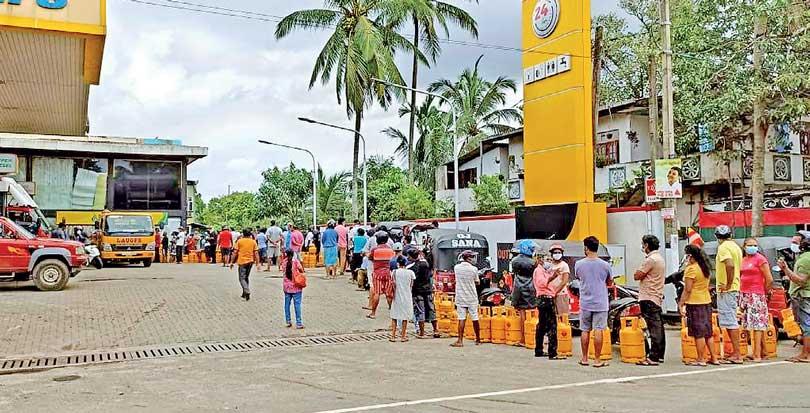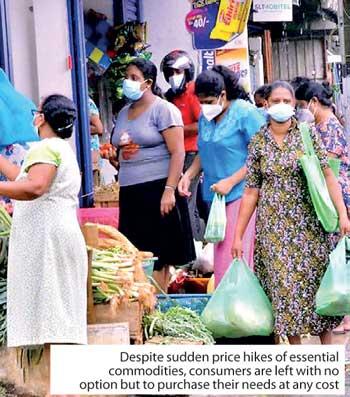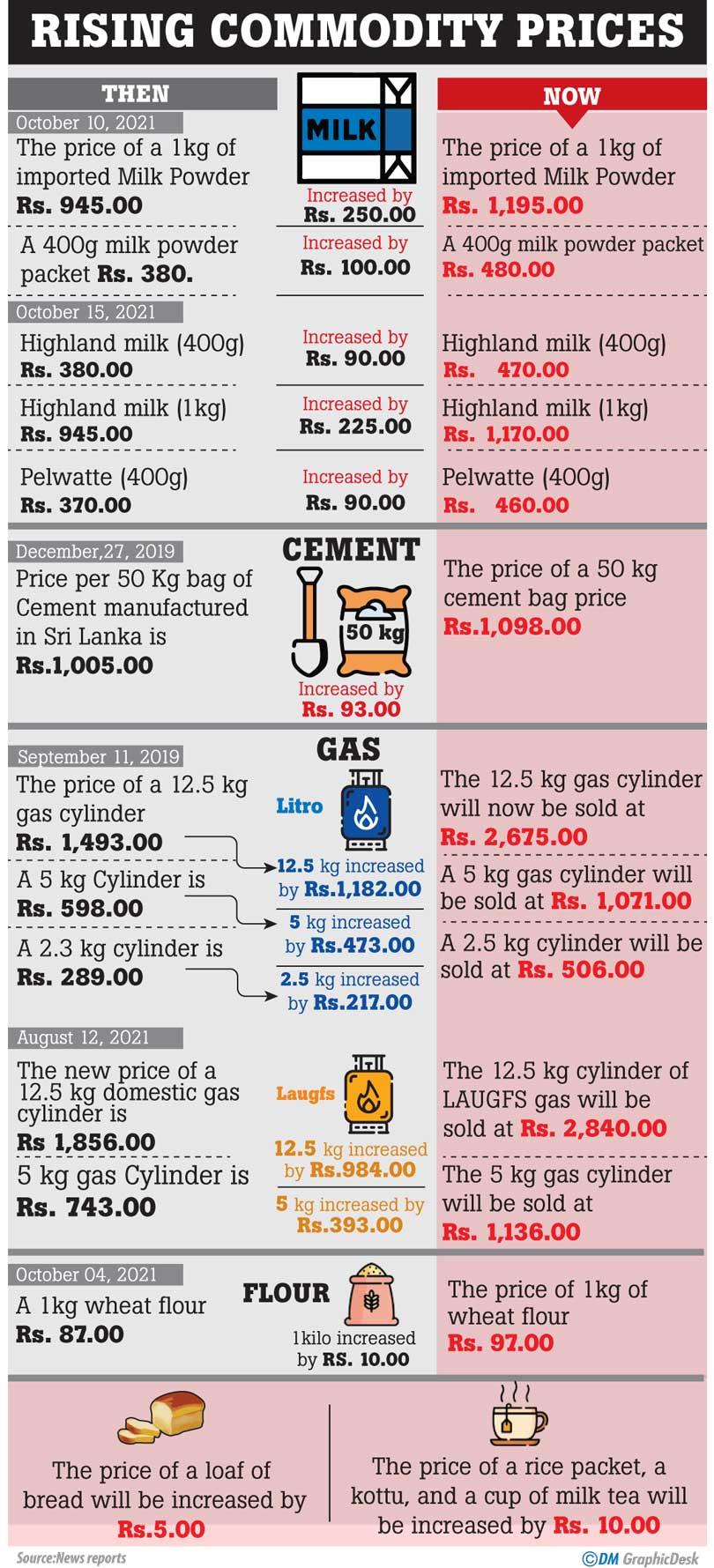19 Oct 2021 - {{hitsCtrl.values.hits}}
 Long queues to purchase gas
Long queues to purchase gas
 In one of his recent addresses to the nation President Gotabaya Rajapaksa requested the citizenry to get ready to make ‘more sacrifices’. Keeping to his word, the prices of essential items were raised overnight as COVID restrictions were relaxed. With that, the cost of a 12.5kg domestic gas cylinder for example, shot up to Rs. 2840 before the price was subsequently brought down by about Rs. 75 as it was an abnormal price increase. Similarly, prices of flour, cement, bread, lunch packets also increased. Milk powder companies too have now revised their prices and supermarket shelves are now stocked with all brands. Fuel prices too may increase in the coming days. In this backdrop, consumers are left with no choice, but to purchase essential items at any cost. But economic experts believe that these approaches would not help the economy, consumers or the government.
In one of his recent addresses to the nation President Gotabaya Rajapaksa requested the citizenry to get ready to make ‘more sacrifices’. Keeping to his word, the prices of essential items were raised overnight as COVID restrictions were relaxed. With that, the cost of a 12.5kg domestic gas cylinder for example, shot up to Rs. 2840 before the price was subsequently brought down by about Rs. 75 as it was an abnormal price increase. Similarly, prices of flour, cement, bread, lunch packets also increased. Milk powder companies too have now revised their prices and supermarket shelves are now stocked with all brands. Fuel prices too may increase in the coming days. In this backdrop, consumers are left with no choice, but to purchase essential items at any cost. But economic experts believe that these approaches would not help the economy, consumers or the government.
Adoption of price controls is wrong : Prof. Abeyratne
 Economic experts believe that ad hoc and piecemeal decisions will not help the economy, consumers or the government at this juncture. “No political mileage could be achieved either,” said Sirimal Abeyratne, Professor of Economics at University of Colombo. “The adoption of price controls is wrong. There’s a long history on the adoption of price controls, but we haven’t achieved the goals when adopting price controls. Similarly, when price controls were reduced it wasn’t successful as it didn’t come as a total policy package.
Economic experts believe that ad hoc and piecemeal decisions will not help the economy, consumers or the government at this juncture. “No political mileage could be achieved either,” said Sirimal Abeyratne, Professor of Economics at University of Colombo. “The adoption of price controls is wrong. There’s a long history on the adoption of price controls, but we haven’t achieved the goals when adopting price controls. Similarly, when price controls were reduced it wasn’t successful as it didn’t come as a total policy package.
“Globally, vaccination programmes have been successful and close to 6 billion people have been vaccinated. As a side effect, prices of items are rising as economies are now recovering. As such the prices of oil and food are on the rise. But we don’t have to worry about global price hikes if the income levels of people are growing. However, we have forgotten policy reforms and it is now a discarded term. Increase in levels of income hasn’t been our usual economic progress. Therefore increase in prices of items will impact consumers,” he added.
When asked if Sri Lanka is ready for foreign direct investments Prof. Abeyratne said, “We haven’t improved our investment climate, especially when comparing it with neighbouring countries. India is one of the top foreign direct investment countries in the world, but Sri Lanka hasn’t progressed because our investment climate hasn’t improved to win investor confidence”.
Another concern is with regard to money printing and inflation. Explaining the relationship, Prof. Abeyratne said that it depends on the time period. All over the world, money printing has escalated. For over 10 years the world economy has been in recession and one of the important features is reduction in prices and interest rates.
This gives space for countries to print more money and mitigate negative impacts on government revenue and spending. But now world economies are moving towards expansion and therefore money printing and inflation have been strengthened. As a result central banks have been pushed back to their primary objective of maintaining price stability,” explained Prof. Abeyratne.
 We don’t have to worry about global price hikes if the income levels of people are growing. However, we have forgotten policy reforms and it is now a discarded term. Increase in levels of income hasn’t been our usual economic progress. Therefore increase in prices of items will impact consumers”
We don’t have to worry about global price hikes if the income levels of people are growing. However, we have forgotten policy reforms and it is now a discarded term. Increase in levels of income hasn’t been our usual economic progress. Therefore increase in prices of items will impact consumers”
- Sirimal Abeyratne, Professor of Economics at University of Colombo
How competition law helps to break monopolies
“The main objective of the Competition Law is to secure consumer welfare through low prices and high outputs,” opined Attorney-at-law Dr.Thashira Gunatilake. “When a healthy competition exists, consumers would not face the threat of paying high prices for goods and shortages of goods created by market players with anti-competitive practices. This is because competition law restricts any player from engaging in anti-competitive practices that would operate against competition objectives. Low prices assured by competition law would lead consumers in the society to save more money and invest it in other development purposes. Further, economic development means equal distribution of wealth. In the absence of competition law, monopoly firms would entertain more privileges and money would accumulate only around them. The rest of the society would dry out. But with the operation of the competition law, money would distribute among all players equally. This enables many players/competitors to invest more in innovation and development. Healthy competition would also exclude inefficient players from the market and facilitate efficient players to exist. Any efficient player left could easily push the economy of the country to its top,” explained Dr. Thashira Gunatilake.
He further said that when a competitive market exists, it attracts foreign investors to the country. “Foreign Direct Investment is the best way a country like Sri Lanka could use at this juncture to develop the economy of the country. Due to the existence of competition law, such foreign players with financial power would not be able to engage in anti-competitive practices to exclude local players from the market and arbitrarily increase the price. Thus, local firms/players would also not go out of business and they could still contribute to the economic development of the country.” said Dr.Gunatilake.
With the operation of the competition law, money would distribute among all players equally. This enables many players/competitors to invest more in innovation and development. Healthy competition would also exclude inefficient players from the market and facilitate efficient players to exist
- Dr. Thashira Gunatilake
Attorney-at-law
Impact on farmers
The soaring cost of living has not only impacted consumers, but farmers as well. “Since farmers do not get a pension or a salary the rise in prices of essential items has impacted them quite badly,” opined Namal Karunaratne, National Organiser of All Ceylon Farmers’ Federation. “One kilo of sugar is Rs. 220 and a kilo of nadu rice is bought at a price of Rs. 60. So paddy farmers have to sell around 5 kilos of rice in order to purchase sugar. A kilo of cooking melon (kekiri) is bought at Rs. 6, this means they have to sell around 39 kilos of cooking melon to purchase a kilo of sugar.
“In a backdrop where rice mill owners and a few players who have a monopoly over certain products deciding on prices, the Government is neither keen on purchasing goods from farmers nor allowing farmers to sell their produce at considerable rates,” he added.
Karunaratne further criticised the government for giving false hopes on fertilisers. “They said they’ll ensure that farmers will receive organic fertilisers by the time the Maha season begins. A month and three days have elapsed since the Maha season commenced and farmers are unable to engage in any harvest. Now the Government is bringing down chemical fertilisers in the guise of organic fertilisers. This is a worrisome situation and if this continues further, farmers will either commit suicide or express their disappointment in an aggressive manner,” he warned.
Several attempts made to contact Trade Minister Bandula Gunawardana to inquire about the government’s plan to provide relief for daily wage earners and people unemployed due to COVID proved futile.

The Government is bringing down chemical fertilisers in the guise of organic fertilisers. This is a worrisome situation and if this continues further, farmers will either commit suicide or express their disappointment in an aggressive manner
- Namal Karunaratne National Organiser of All Ceylon
Farmers’ Federation

Voice of the people
The Daily Mirror also inquired how the sudden rise in prices of essential items impacted consumers on social media. Here’s what they shared with us :
‘We have no idea how much went under the carpet’
“Rs 2 billion has been allocated for Jogging Tracks ( no idea how it’s going to help the economy ) and no one asked for VAT reductions and that cost the economy over Rs 750 billion. We have no idea how much went under the carpet for Antigen, PCR and Vaccines.”
- Michael Ranasinghe
‘We’re now paying for failed, unproductive projects’
“These are signs of a failed state. We’re now paying for the failed, unproductive projects that were financed through borrowing.”
- Fredrick Abeyratne
‘Sri Lankans are depending mostly
on imports’
“Inflation post-COVID is a situation experienced by many developing countries. Even developed countries experience the same. We Sri Lankans are depending mostly on imports, and this global commodity price increases eventually hit us as end consumers. Now at least the essentials are available in the market.” - Thilini De Silva
‘It’s time to say good bye to Mother Lanka’
“High inflation is the exact word to describe the situation, Sri Lanka is in the process of being the next Somalia if it continues. We understand that the Government has to increase the prices of essential items in order to balance the Rupee decrement. However organisations that profit in foreign currency may increase their pay to match the inflation. It’s a double sided game where a Government keeps increasing the prices, but the organisations pretend that they are not in a position to offer an increment to their employees. It’s time to say good bye to Mother Lanka.” - Jeroy Canute
‘It’s a killing machine for an
ordinary man’
“Cost of living is a good indicator to assess the essential market. However it’s a killing machine for an ordinary man on the street when he hadn’t been supported by the appropriate income growth.” - S. Mayurathan

26 Nov 2024 19 minute ago
26 Nov 2024 28 minute ago
26 Nov 2024 1 hours ago
26 Nov 2024 2 hours ago
26 Nov 2024 2 hours ago